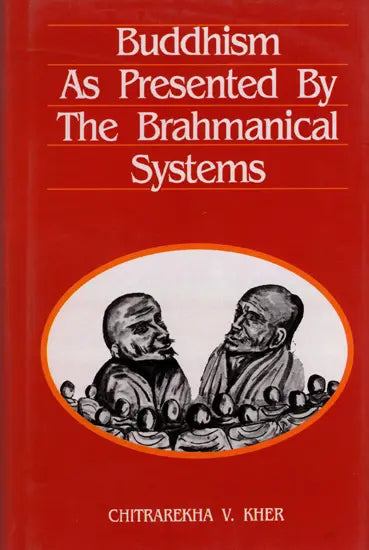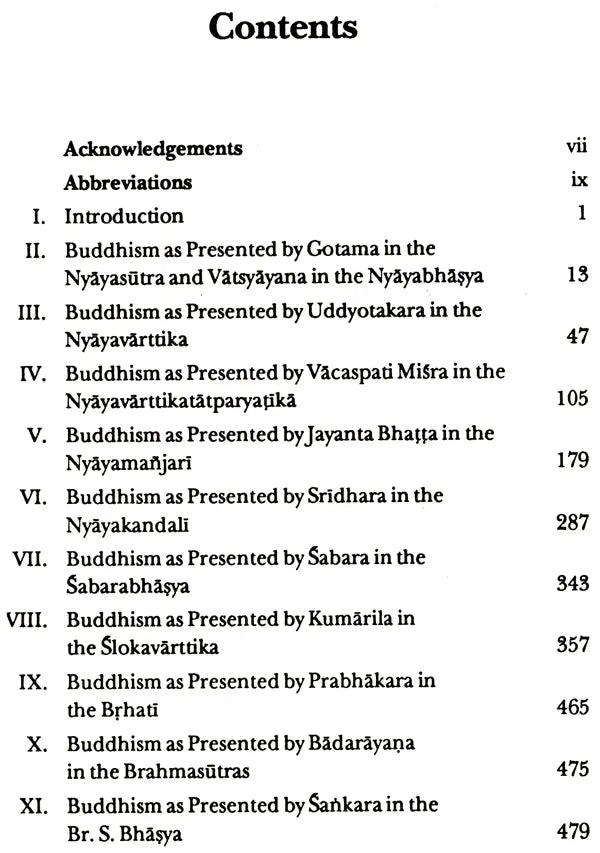Buddhism As Presented by the Brahmanical Systems (Bibliotheca Indo-buddhica)
Buddhism As Presented by the Brahmanical Systems (Bibliotheca Indo-buddhica) is backordered and will ship as soon as it is back in stock.
Couldn't load pickup availability
Genuine Products Guarantee
Genuine Products Guarantee
We guarantee 100% genuine products, and if proven otherwise, we will compensate you with 10 times the product's cost.
Delivery and Shipping
Delivery and Shipping
Products are generally ready for dispatch within 1 day and typically reach you in 3 to 5 days.
Book Title: Brahmanical and Buddhist Philosophies: A Comparative Analysis
-
Author: Chitrarekha V. Kher
-
Language: English
-
Pages: 692
-
Cover: Hardcover
-
Dimensions: 23 cm x 15 cm
-
Weight: 890 gm
-
Edition: 1992
-
ISBN: 9788170302933
Book Description
About the Book:
This comprehensive work delves into the philosophical systems of India, analyzing both the Brahmanical and Buddhist traditions, with a focus on their differing views on reality and spiritual experiences. The Indian philosophical systems are traditionally divided into two broad categories: the Astika (orthodox) systems, which accept the Vedas as the ultimate source of authority, and the Nastika (heterodox) systems, which reject the Vedas and include Buddhism and Jainism. The division reflects not only the acceptance or rejection of the Vedas but also the contrasting approaches these systems take to solving the problem of reality.
The Brahmanical systems (including Nyaya, Vaisheshika, Sankhya, Yoga, Purva Mimamsa, and Uttara Mimamsa) emphasize a positive outlook toward life and reality, integrating belief in the Vedic scriptures and adhering to traditional social orders. On the other hand, Buddhism has always taken a negative stance—rejecting the Vedic system, the caste system, and even the idea of an eternal soul. This book explores how these systems have been in continuous intellectual conflict, especially in their views on self, causality, soul, and social order.
Key Themes:
-
Philosophical Division:
The book explains the division between the Astika (orthodox) systems, which include the six classical schools of Indian philosophy that accept the authority of the Vedas, and the Nastika (heterodox) systems like Buddhism and Jainism that reject the Vedas. This distinction does not merely mark a difference in the acceptance of sacred texts but also reflects deeper philosophical disagreements, particularly in the interpretation of reality. -
Brahmanical Systems:
The six orthodox Brahmanical systems—Nyaya, Vaisheshika, Sankhya, Yoga, Purva Mimamsa, and Uttara Mimamsa—are discussed in depth, highlighting their shared focus on Vedic authority, social order, and the acceptance of an eternal soul. These systems emphasize the importance of tradition and social harmony, which are built on the belief in sacrifices, rituals, and the four stages of life. -
Buddhist Philosophy:
In contrast to the Brahmanical systems, Buddhism introduces a negative approach, rejecting key Brahmanical doctrines. Buddhism denies the existence of an eternal soul (atman) and posits that everything is in a state of constant flux. The text explains the Buddhist rejection of causality, social hierarchies, and sacrificial rituals, and its focus on suffering and enlightenment as the ultimate goal. -
Philosophical Conflicts:
The ongoing intellectual warfare between Brahmanical and Buddhist philosophers is explored, particularly in their debates over the existence of the soul, the nature of causality, and the role of rituals. The Brahmanical systems, grounded in tradition, view Buddhism as a disruptive force, while Buddhist thinkers challenge the very foundation of Brahmanical thought. -
Buddhism's Rejection of Social Hierarchies:
Buddhism's anti-caste stance is one of its most significant philosophical contributions. Rejecting the four varnas (castes), Buddhism promoted a more egalitarian view of society, where social distinctions based on birth were abolished. This critique of social inequality directly challenged the Brahmanical social order, contributing to its enduring conflict with the Brahmanical tradition. -
Philosophical Works of Major Thinkers:
The book features 19 chapters detailing the views of Buddhism as presented by major thinkers in the Brahmanical traditions. Key chapters cover interpretations of Buddhism by thinkers like Gotama, Vatsyayana, Udyotakara, Vacaspati, Kumarila, Prabhakara, Vyasa, and Sankara. Each chapter offers an analysis of how these scholars dealt with the Buddhist critiques and attempted to refute or incorporate Buddhist ideas into the broader philosophical discourse. -
Impact of Buddhism on Indian Philosophy:
The influence of Buddhism on Brahmanical thought is explored, particularly in how Buddhist logic, ethics, and ontology challenged the assumptions of Brahmanical philosophy. Despite their philosophical differences, these schools engaged deeply with one another, leading to a rich tradition of intellectual exchange.
Notable Chapters:
-
Buddhism as presented by Gotama in the Nyayasutra and Vatsyayana in the Nyayabhasya
-
Buddhism as presented by Udyotakara in the Nyayavarttika
-
Buddhism as presented by Vacaspati Misra in the Nyayavarttikatatparyatika
-
Buddhism as presented by Kumarila in the Slokavarttika
-
Buddhism as presented by Sankara in the Brahmasutras Bhasya
-
Buddhism as presented by Patanjali in the Yogasutras
-
Buddhism as presented by Vyasa in the Yogabhasya
These chapters provide a comprehensive view of how key Brahmanical philosophers engaged with Buddhist thought, offering both criticisms and adaptations of Buddhist principles.
Introduction Overview:
The introduction lays the foundation for the philosophical distinction between the Brahmanical and Buddhist systems. It explains how the division is based on the acceptance or rejection of the Vedas and their implications for social and spiritual life. It also discusses the negative attitude of Buddhism toward social structures, the caste system, and the material world, in contrast to the positive outlook of Brahmanical systems. The introduction touches upon the Buddhist critique of rituals, social class distinctions, and the soul's existence, framing these issues within the larger intellectual context of Indian philosophy.
Why Read This Book?
-
Comprehensive Comparison:
The book offers a detailed and comprehensive comparison between the Brahmanical and Buddhist philosophical traditions, covering key texts, thinkers, and debates. -
Historical and Intellectual Insight:
It provides invaluable insight into the intellectual history of India, particularly the evolution of Buddhist thought and its impact on Brahmanical philosophy. -
Social and Philosophical Context:
The book also delves into the social implications of these philosophical systems, shedding light on how Brahmanical and Buddhist views shaped societal norms and ethical practices in ancient India. -
Scholarship and Clarity:
With clear analysis and thorough research, the book is an excellent resource for those interested in Indian philosophy, Buddhist studies, and comparative philosophy.
About the Author:
Chitrarekha V. Kher is a scholar of Indian philosophy with a focus on the Brahmanical and Buddhist traditions. She has contributed extensively to the study of philosophical systems in India and is known for her analytical approach to the intellectual conflicts between different schools of thought.
Brahmanical and Buddhist Philosophies: A Comparative Analysis offers an in-depth examination of the philosophical divide between Brahmanism and Buddhism in India, making it an essential resource for anyone interested in the history of Indian philosophy, Buddhist philosophy, and comparative religious studies.



















